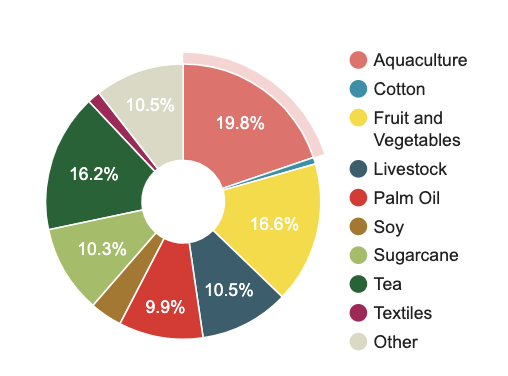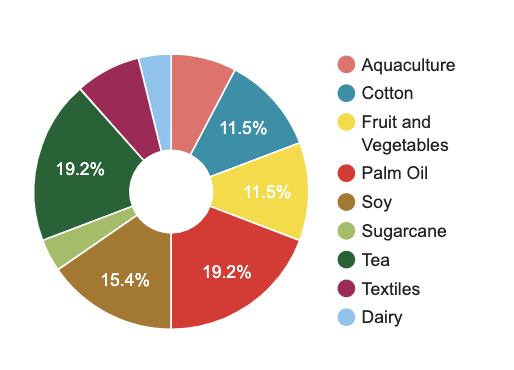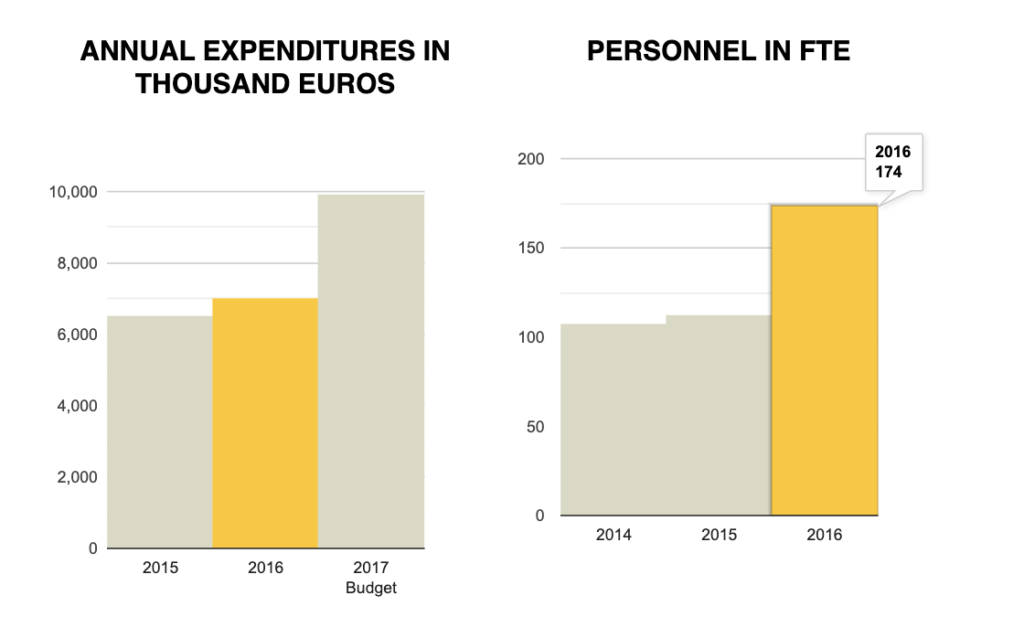AQUACULTURE
Solidaridad secured a second round of funding in Bangladesh for Solidaridad’s sustainable agriculture and food security programme. In addition to the current participation of 1,000 producer groups, which will continue to receive support, another 500 groups will gain access to the programme, expanding the reach of the programme to 100,000 households. A key improvement will be an enhanced focus on spatial planning to reduce conflict in the crowded delta.

DAIRY
After three years In Bangladesh, the SaFaL programme has been successful in achieving real progress for 17,000 dairy farmers, setting up well-organized dairy farmer groups, partnering with BRAC as a private dairy company, and establishing milk collection centres and other kinds of SMEs. Solidaridad will continue this approach with more focus on developing SMEs, forming dairy producer companies, and organizing community-driven professional dairy farming and processing.

FRUIT & VEGETABLES
Together with FrieslandCampina Riedel, a programme was implemented in India in which training was provided to improve labour circumstances in the processing industry. Solidaridad also broadened its partnership with Islam Enterprise and two other exporters to scale contract farming. Together with the three entrepreneurs and with support from the Department of Agricultural Extension (DAE), GoB, SaFaL is mobilizing 200 mango and 500 vegetable producers.

LEATHER
Our leather programme witnessed some major milestones. A multi-stakeholder platform was successfully launched under the auspices of the National Mission for Clean Ganga. The common goal is pollution prevention and efficient water use in the Kanpur-Unnao leather cluster. Successful pilots included reducing sulphides and other chemicals in the waste water stream, and zero waste discharge through electro-oxidation. The programme was presented to the Dutch King and Queen during their visit to India in November.

PALM OIL
Through the Asian Sustainable Palm Oil Network, a multi-stakeholder platform, Solidaridad supported alignment of sustainable production, trade and consumption of palm oil in Indonesia, Malaysia, China and India. Solidaridad also supported 12,000 producers in implementing BMPs and 400 workers with better labour conditions in India. In West Kalimantan, Indonesia, Solidaridad worked with Credit Union Keling Kumang to provide 900 farmers with BMP training, 2,000 members with financial literacy training and 2,400 farmers access to good agricultural inputs.

SOY
In India, soy production is continuing its increasing relevance and share among small-scale producers. Soy is viewed as a quick cash crop. There is also a strong gender component because women are included for manual labour in the fields. With this context in mind, Solidaridad put special focus on increasing financial security for soy by creating direct links with medium and big processors. Projects also focused on empowering women in commercial and financial transactions linked to soy.

SUGARCANE
Solidaridad continued to implement the water efficiency programme in the sugarcane sector in India. Coca-Cola and IFC supported the programme in Uttar Pradesh which focuses on good agricultural practices, water efficiency, integrated communication technology, agri-tech services and capacity building. To understand and scientifically manage water efficiency, four integrated water trials were organized in various agro-climatic zones. The results indicate that multiple possibilities for reducing water use and improving water efficiency do exist.

TEA
Trustea, the India sustainable tea programme, completed its third successful year with significant milestones being achieved. The Trustea programme emerged as the largest tea code for sustainability by transforming 36% of India’s tea production.

COTTON
Despite untimely rainfall alternating with long periods of dry weather that have taken a heavy toll on the cotton crops in many parts of the country, Solidaridad’s cotton programme in India has been able to support more than 40,000 farmers in adopting good agricultural practices. Furthermore, Solidaridad conducted a knowledge sharing event in March 2016 with the most important stakeholders of the Better Cotton projects. Implementing partners, several scientists from the Central Institute of Cotton Research and the BCI country representative actively participated in the event.

In the tannery cluster of Kanpur, India, Solidaridad began its first leather project to promote inclusive land and water efficiency, and cleaner production. The tannery cluster produces about 400 tons of liquid and solid waste daily, full of chemicals from the leather making process. Together with the tannery associations, Solidaridad is working on improving the water quality in the Ganga Basin.

Solidaridad furthered its mission to bring established best practices to scale, with a particular focus on promoting the uptake of sustainable design, development and procurement practices at the brand level. At the same time, the organization also built on early initiatives in emerging textile-producing nations, where Solidaridad is playing a key role in ensuring that best practices and experiences from established industries can steer a path to sustainable growth.

DEVELOPMENTS
Producing more food with fewer natural resources to meet ever-rising and evolving demand is emerging as the ultimate challenge for Asia. Pressures on land, water, and energy resources are increasing due to competing claims. Moreover, the average farm sizes are becoming smaller and availability of farmland scarce.
The Indian government committed to a goal of doubling farm income in five years. To achieve that, the government launched e-NAM, a pan-India electronic portal for the sale and purchase of agri-produce. A new law on contract farming is also in the process of being finalized.
The Indonesian government launched a massive push towards self-sufficiency in rice production, followed by corn, sugarcane and soybean. In 2016, Indonesia was able to achieve self-sufficiency in rice and now the focus is on soy, corn and sugarcane.
In Bangladesh, Prime Minister Sheikh Hasina’s government is giving priority to strengthening the rural economy further and building a social safety net for the rural poor people.
The sustainability discourse in Asia revolves around locally developed and owned standards. For example, the Indian government actively supports the Trustea standard for tea. The Indonesian government is working on a presidential decree to make Indonesian Sustainable Palm Oil (ISPO) an independent entity. In addition, the Malaysian government made Malaysian Sustainable Palm Oil (MSPO) certification mandatory by 2019. Solidaridad is actively supporting the implementation of these schemes in all the three countries.
INVESTMENTS PER PROGRAMME

PARTNERS PER PROGRAMME

ACHIEVEMENTS
Solidaridad initiated two significant collaborations between India and China. The Code for Responsible Extraction (CORE) founded by Solidaridad is one of the first independently auditable global standards for minerals at the extraction site, supported by leading companies as well as other civil society organizations. Solidaridad’s field team helped 32 mines in India and China with external auditors. A tripartite MoU was alsosigned between Solidaridad, United Planters’ Association of India and China Tea Marketing Association to develop a mutually acceptable framework for a sustainable tea sector in Asia based on the new Sustainable Development Goals (SDGs).
Solidaridad initiated two landscape programmes in India and Indonesia. In India, the landscape programme focused on the Middle Ganga plain in the state of Uttar Pradesh. This project intends to address the challenges of effluents from tannery clusters in the region that pollute the river. The project also hopes to address high water consumption by sugar mills which affect the flow of the river.
In Indonesia, the landscape programme has been piloted in six districts around the Mount Merapi region in Central Java which allows the regional government to make informed and evidence-based policy and programme decisions. The solutions derived from different pilots would be the key for inclusive and sustainable landscape development.
The Trustea programme, a local Indian sustainability standard for tea, emerged as the largest tea code which has transformed 36% of India’s tea production with more than 370 million kilos of verfified tea. The project supported 441 tea estates with 350,000 workers (50% women), and 25,578 smallholders working under Trustea sustainability standard guidelines.
The SaFaL programme in Bangladesh has so far helped 57,000 smallholder farmer families to become effective agricultural entrepreneurs. The introduction of contract farming between mango farmers and exporters triggered the export of mango to the European market. The Bangladesh Ministry of Agriculture is adopting the contract-framing model of SaFaL for safe food production as part of a national action plan.

PARTNERSHIPS
Critical partnerships were forged with governments in 2016. Solidaridad signed MoUs with the Malaysian Palm Oil Board, the Solvent Extractors Association of India and the Central Java government of Indonesia.
Solidaridad continued to work in close collaboration with a range of donors to implement programmes. Key amongst them were the Dutch embassy in Bangladesh for the SaFaL programme, and RVO for the water efficiency programme in sugarcane in India. IDH, Unilever and Tata were the main funders for the sustainable tea programme in India. Coca-Cola India, IFC and Pepsico were the main supporters for sugarcane. BASF, Arkema and Jayant Agro were primary funders for sustainable castor oil programme and the Packard Foundation for sustainable palm oil in Indonesia.
Solidaridad further strengthened its partnerships with major business in the food sector of India, namely: Hindustan Unilever Limited, Tata Global Beverages Limited, Ruchi Soy, Jayant Agro, Vippy Soya, DSCL Sugars, Olam International, EID Parry, NSL Sugar, Rajshree Sugar. Solidaridad also facilitated 14 company/private-sector organization investments in the SaFaL supply chains of Bangladesh.
ORGANIZATION
Solidaridad’s operation in the region continued to grow rapidly throughout the year. In 2016, it was operating in eight countries with 14 offices in South and South-East Asia. The staff strength rapidly increased from 107 FTEs in 2014 to 243 FTEs in 2016.
The reason for the growth is due to changes in the business model where corporate partners increasingly seek Solidaridad’s support for implementing change in their supply chain directly. Most of the staff in the local offices are drawn from diverse backgrounds and are experts in delivering high-value services to Solidaridad’s business partners and donors. One of the benefits of such model is increased efficiency in the delivery of projects and the ability to undertake more complex activities which are difficult to conduct in an out-sourced model.
In addition, Solidaridad recruited part-time representatives in Myanmar and Israel to incrementally develop the portfolio in these countries. In 2017, Solidaridad hopes to open full country offices in Malaysia, Japan and Myanmar.
Total Income of regional office in 2015 was €7,121,486 out of which programme expenses were €6,577,946 (92% of total expenses) administrative expenses €453,681 (6.5% of total expenses including fundraising, organizational and communication costs). The budget for 2017 has increased significantly to €13,500,000.
